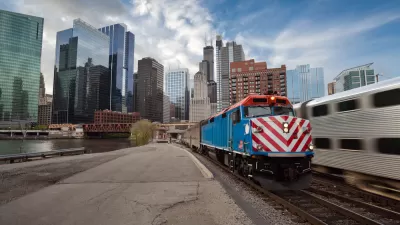The Obama administration has pumped $2.5 billion in stimulus funds into the advanced battery industry, with the goal of creating manufacturing jobs. But will supporting green cars mean supporting sprawl in the long-term?
Several urbanist writers have been remarking on a recent New York Times article titled "Does America Need Manufacturing?" The article focuses on the Obama administration's embrace of the lithium-ion battery industry, which it sees as a win-win because of job creation combined with green technology. But commenters wonder if creating batteries that extend the life of the car industry is a good thing.
Matt Yglesias writes:
"As long as the federal government remains formally and informally committed to the proposition that "what's good for General Motors is good for America" it's not really possible to have sound transportation policies writ large. You can try to take this cars/oil/steel industrial policy and nudge it in a greener direction with subsidies for electric cars, but no car-focused industrial policy is going to be as green as backing away from having the most energy intensive possible built environment of roads, homes, and offices."
FULL STORY: Automobile-Focused Industrial Policy

Maui's Vacation Rental Debate Turns Ugly
Verbal attacks, misinformation campaigns and fistfights plague a high-stakes debate to convert thousands of vacation rentals into long-term housing.

Planetizen Federal Action Tracker
A weekly monitor of how Trump’s orders and actions are impacting planners and planning in America.

In Urban Planning, AI Prompting Could be the New Design Thinking
Creativity has long been key to great urban design. What if we see AI as our new creative partner?

King County Supportive Housing Program Offers Hope for Unhoused Residents
The county is taking a ‘Housing First’ approach that prioritizes getting people into housing, then offering wraparound supportive services.

Researchers Use AI to Get Clearer Picture of US Housing
Analysts are using artificial intelligence to supercharge their research by allowing them to comb through data faster. Though these AI tools can be error prone, they save time and housing researchers are optimistic about the future.

Making Shared Micromobility More Inclusive
Cities and shared mobility system operators can do more to include people with disabilities in planning and operations, per a new report.
Urban Design for Planners 1: Software Tools
This six-course series explores essential urban design concepts using open source software and equips planners with the tools they need to participate fully in the urban design process.
Planning for Universal Design
Learn the tools for implementing Universal Design in planning regulations.
planning NEXT
Appalachian Highlands Housing Partners
Mpact (founded as Rail~Volution)
City of Camden Redevelopment Agency
City of Astoria
City of Portland
City of Laramie





























